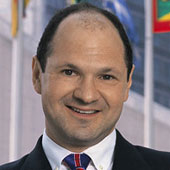Kids Packing Bags For the Empire?
What kind of future is the U.S. education system preparing young Americans for?
February 28, 2004
All around the world, kids are growing up fast. In the United States, however, something seems to be growing even faster — their backpacks.
Those kids hurrying to school in the morning are literally bent to the ground under the weight of their school backpacks.
Parents often wonder how their still quite young boys and girls manage to haul something they themselves can barely lift.
Medical professionals have long expressed concern about the weight and size of the school backpacks American students have to carry.
True, many U.S. children are overweight — and under-exercised. But lugging backpacks that weigh 30 to 40 pounds is the wrong type of physical activity for them.
It is one that can stunt growth and result in chronic back and joint injuries late in life. But educators and textbook publishers have a strong case as well.
Ours is an age of acute global competition for knowledge, in which American kids must endeavor to hold their own to survive. After all, this is the information age.
But wait a minute. We are not just in the information age. Isn’t this also the age of managing information rationally?
Don't we own all those computers, access e-mail and the Internet? Wasn't the information technology revolution supposed to create a paperless society?
Despite all these lofty goals, U.S. textbook publishers seem to be selling their products by weight.
And teachers require their students to bring all that pulp to class every day, even though all that knowledge could — and should — be available in an electronic format.
Maybe there is a hidden agenda. Maybe the reason these U.S. kids are lugging those heavy bags is not because they have to compete with their Japanese, Korean, Chinese and European peers on how well they know math or can work a computer.
Perhaps it is more about getting ready for overseas expeditions instead. Indeed, the history of great empires shows that these countries produce many more soldiers than scholars.
Before the United States, Rome was the only other nation in the history of Western civilization to become the unchallenged superpower of its era.
And the Romans spent most of their time on the road. They marched to preserve the Pax Romana in various corners of their far-flung empire.
Julius Caesar vividly describes the troubled life of a superpower soldier in his De Bellum Gallicum. Spain, which ruled half the world in the 16th century, at the time possessed most of the Western Hemisphere and a large chunk of Europe.
And yet, it had an impoverished society with an extremely ragged army. Its cultural and intellectual achievements could never compare to the contemporary efflorescence of the arts and sciences in Italy, for example.
In the 19th century, Britain owned an empire over which the sun never set, but Paris remained the unrivalled intellectual and artistic capital of the world — where cultured Anglo-Saxons from Britain and the United States also flocked.
The Brits had a lot of money — but they had to carry their self-imposed White Man's Burden as well.
And in our own times, Russia was the last major land empire to collapse. While Russia controlled one-sixth of the dry land on the globe, the Russians themselves were among the poorest ethnic groups in their own empire.
Young Russian soldiers fought — and died — in such far-flung corners of the globe as Hungary, Angola and Afghanistan.
And, in fact, only a decade or so after becoming a superpower, Americans have already had plenty of adventures being a world police officer.
The first Gulf War, Somalia, Bosnia and Kosovo appear to be only rehearsals for the greater strategy of reshaping the Middle East.
With over 130,000 U.S. soldiers in Iraq — and many more stationed in far-flung locations around the globe — the U.S. military needs a steady flow of young recruits who are fit and able to serve.
Could it be that the U.S. educational system is inadvertently preparing young Americans for their real future as citizens of a superpower?
The mission is to be ready to fight numerous wars of liberation — for the Iraqis and others.
For that, they will have to be able to carry heavy loads of equipment — as the infantry has done since the Roman times. Their schools, then, are giving them an early taste of boot camp.
Yet one wonders whether textbook publishers, school authorities and teachers should not get together and decide that it is high time to lighten the load on the backs of all those kids.
Read previous
Obesity — Big is Beautiful?
February 27, 2004
